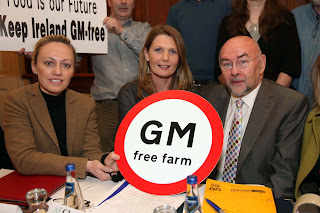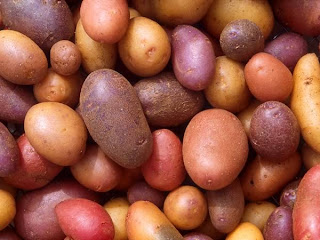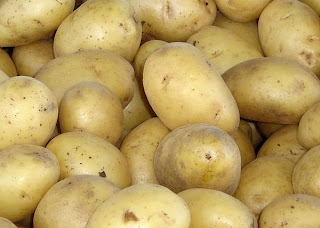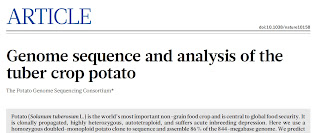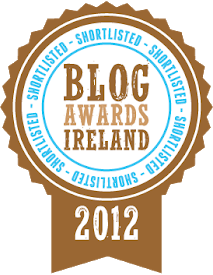GM trial gets go-ahead
A genetically modified potato variety will be planted in Ireland as part
of a Teagasc-led experimental trial, which has today got the
'green-light' from Ireland's Environmental Protection Agency (EPA).
The field trials were allowed to proceed after an assessment of the experimental plans and designs by the EPA and a broad-ranging consultation process. The EPA also received 83 representations from interested parties - all objecting to the proposed trials. I've previously written about why, I think, this trial is needed.
Teagasc applied for a liscence to plant the potatoes back in January. These plants contain a gene which makes them resistant to late blight (Phytophthora infestans) - the organism which caused the Irish potato famine. This gene has been taken from a wild, related potato variety and inserted into the cultivated potato using GM technology.
The EPA have given their consent to the trials subject to eight conditions, saying in their decision: "The agency believes that the risk to human health and the environment from the deliberate release of these GM potatoes is negligible".
The conditions include a requirement of Teagasc to monitor the experimental site for at least four years after planting. They also require Teagasc to report to the EPA every two months on the progress of the experiments and to set up a 40m exclusion zone around the site where no commercial potato planting can take place.
 This
trial will ensure that we can have real experimental data, based on
Irish conditions, so that we can sensibly assess the impact of GM potato
planting on the environment under closely monitored and controlled
conditions. From reading through the large number of submissions,
it is clear that a large number of those objecting are calling for
"more information" before such planting takes place. They seemingly fail
to see that this trial is specifically design to provide that
information they crave; and to do so in a safe, controlled and
carefully-monitored fashion.
This
trial will ensure that we can have real experimental data, based on
Irish conditions, so that we can sensibly assess the impact of GM potato
planting on the environment under closely monitored and controlled
conditions. From reading through the large number of submissions,
it is clear that a large number of those objecting are calling for
"more information" before such planting takes place. They seemingly fail
to see that this trial is specifically design to provide that
information they crave; and to do so in a safe, controlled and
carefully-monitored fashion.
There will be a large amount of hyperbole written and spoken about this decision in the next few days. Already, the Organic Trust has warned of "grave ramifications" and a Green party spokesman has suggested it will do "untold damage to Irish farming". On the other hand, those welcoming the decision may talk of feeding the world and food security. In reality, the product of this decision will be far less clear-cut. We will hopefully learn more about how GM plants work in the Irish environment and those who support or oppose GM will continue to argue their own side of the debate.
I believe this is a positive step forward however. This experiment will provide real results which can only add to, enrich and enlighten what is an already heated debate. I look forward to seeing the results of this experiment.
This post also appears on the Cork Independent Blog.
The field trials were allowed to proceed after an assessment of the experimental plans and designs by the EPA and a broad-ranging consultation process. The EPA also received 83 representations from interested parties - all objecting to the proposed trials. I've previously written about why, I think, this trial is needed.
Teagasc applied for a liscence to plant the potatoes back in January. These plants contain a gene which makes them resistant to late blight (Phytophthora infestans) - the organism which caused the Irish potato famine. This gene has been taken from a wild, related potato variety and inserted into the cultivated potato using GM technology.
The EPA have given their consent to the trials subject to eight conditions, saying in their decision: "The agency believes that the risk to human health and the environment from the deliberate release of these GM potatoes is negligible".
The conditions include a requirement of Teagasc to monitor the experimental site for at least four years after planting. They also require Teagasc to report to the EPA every two months on the progress of the experiments and to set up a 40m exclusion zone around the site where no commercial potato planting can take place.
 This
trial will ensure that we can have real experimental data, based on
Irish conditions, so that we can sensibly assess the impact of GM potato
planting on the environment under closely monitored and controlled
conditions. From reading through the large number of submissions,
it is clear that a large number of those objecting are calling for
"more information" before such planting takes place. They seemingly fail
to see that this trial is specifically design to provide that
information they crave; and to do so in a safe, controlled and
carefully-monitored fashion.
This
trial will ensure that we can have real experimental data, based on
Irish conditions, so that we can sensibly assess the impact of GM potato
planting on the environment under closely monitored and controlled
conditions. From reading through the large number of submissions,
it is clear that a large number of those objecting are calling for
"more information" before such planting takes place. They seemingly fail
to see that this trial is specifically design to provide that
information they crave; and to do so in a safe, controlled and
carefully-monitored fashion.There will be a large amount of hyperbole written and spoken about this decision in the next few days. Already, the Organic Trust has warned of "grave ramifications" and a Green party spokesman has suggested it will do "untold damage to Irish farming". On the other hand, those welcoming the decision may talk of feeding the world and food security. In reality, the product of this decision will be far less clear-cut. We will hopefully learn more about how GM plants work in the Irish environment and those who support or oppose GM will continue to argue their own side of the debate.
I believe this is a positive step forward however. This experiment will provide real results which can only add to, enrich and enlighten what is an already heated debate. I look forward to seeing the results of this experiment.

